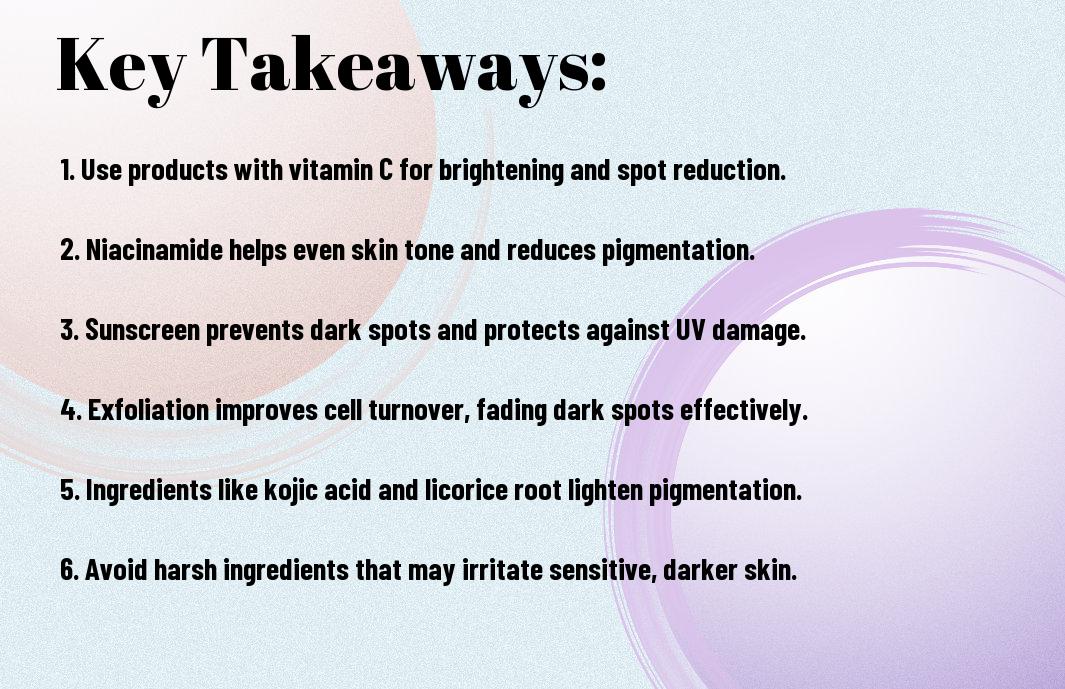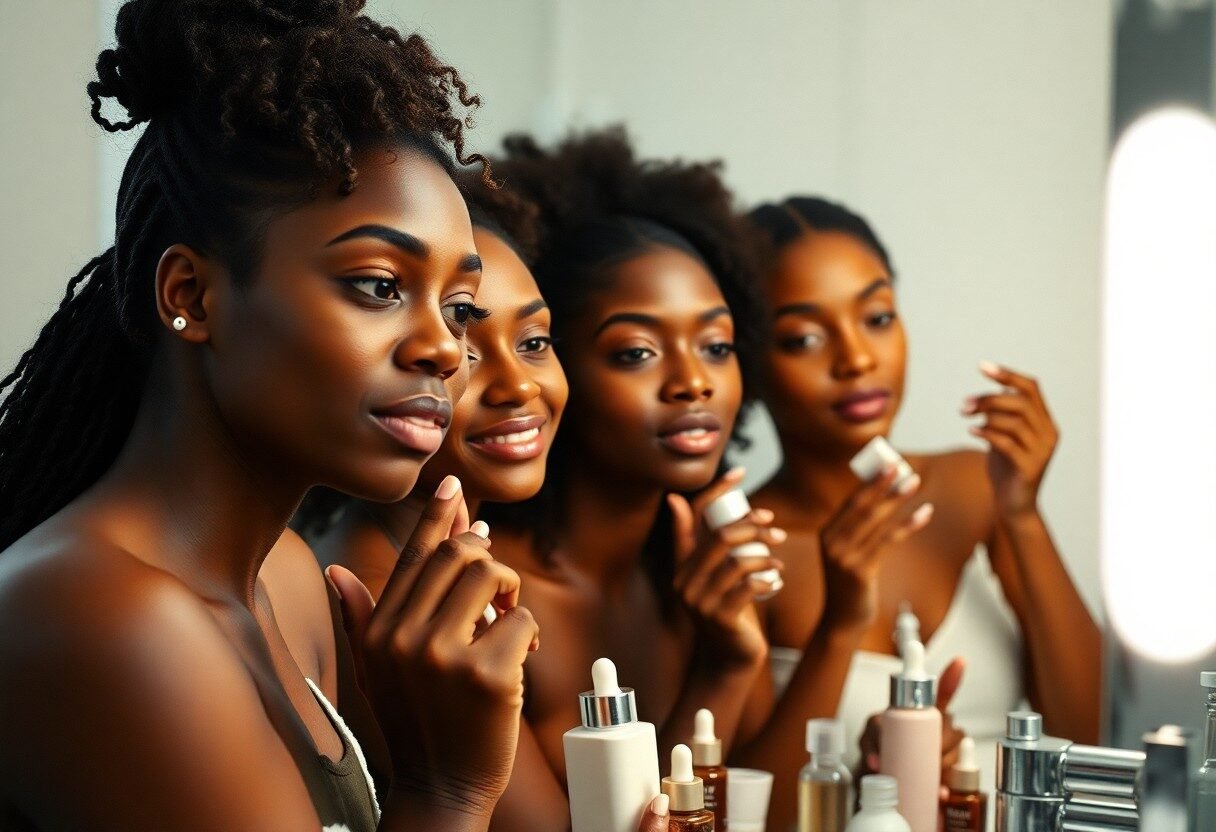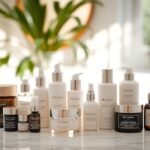
You deserve to have radiant, even-toned skin, and that can be achieved with the right skincare products. As someone who understands the challenges faced by women of color regarding pigmentation and dark spots, I want to share my insights on effective solutions. There are formulations specifically designed to target melanin production and promote skin clarity, which can make a significant difference in your skincare journey. In this post, I’ll guide you through some of the best products available that have helped many of us achieve a brighter complexion.
Key Takeaways:
- Look for products with active ingredients like vitamin C, niacinamide, and hydroquinone, which are effective in reducing pigmentation and dark spots.
- Gentle exfoliation using chemical exfoliants, such as alpha hydroxy acids (AHAs) and beta hydroxy acids (BHAs), can help to fade dark spots by promoting skin cell turnover.
- Sun protection is vital; broad-spectrum sunscreen with SPF 30 or higher should be used daily, as UV exposure can worsen pigmentation.
- Consider incorporating serums and creams specifically designed for hyperpigmentation that target melanin production and promote an even skin tone.
- Natural ingredients like licorice root extract, kojic acid, and azelaic acid are also good options for women of color, as they tend to be gentler on darker skin tones.
- Consult with a dermatologist for personalized recommendations and to explore options like chemical peels or laser treatments if over-the-counter products are not effective.
- Be patient with the results; consistent use of products tailored for pigmentation can take time to show improvement in dark spots.

The Science Behind Hyperpigmentation in Melanin-Rich Skin
Understanding hyperpigmentation in melanin-rich skin requires a investigate the complex interplay of genetic and environmental factors. Melanin, produced by melanocytes, acts as a natural sunblock, protecting the skin from UV damage. However, when these melanocytes become overactive due to various triggers, excess melanin is produced, leading to patches of darkened skin. This condition is particularly prevalent in women of color, as our skin tends to respond more strongly to these triggers, resulting in uneven pigmentation and dark spots that can affect self-esteem.
Causes of Dark Spots and Uneven Skin Tone
Dark spots and uneven skin tone arise from a variety of factors, including sun exposure, hormonal changes, and skin injuries. Post-inflammatory hyperpigmentation frequently occurs after acne or eczema flare-ups, with darker skin types being especially susceptible. In addition, certain medications and conditions, like pregnancy, can trigger melasma. I often find that assessing lifestyle choices, such as diet and skincare regimen, is vital in identifying the root causes affecting your unique skin.
Melanin Production and Its Impact on Skin Health
Melanin production is influenced by both genetic predisposition and external factors such as UV exposure. While melanin provides natural protection against UV damage, an overproduction can lead to skin issues. Uneven melanin distribution can manifest as dark spots, contributing to an overall uneven skin tone. You might notice that specific areas of your skin become darker after sun exposure or inflammatory conditions, emphasizing the importance of understanding your skin’s unique response to various stimuli.
Increased melanin production occurs as a protective response to sun exposure or injury. For instance, when the skin is damaged, melanocytes ramp up melanin production to help shield deeper layers from further harm. This process, while protective, can lead to the development of hyperpigmentation, particularly in individuals with darker skin tones. After suffering from conditions like acne or dermatitis, you may observe that the skin heals with darker spots where inflammation occurred. Monitoring sun exposure and using targeted skincare products can help manage and prevent these issues effectively.
Key Ingredients That Target Pigmentation
Several active ingredients play significant roles in treating pigmentation and dark spots effectively. These components not only target existing discolorations but also help prevent future formation, ensuring a more even skin tone. Understanding these ingredients allows you to make informed choices when selecting skincare products that will address your specific concerns while being gentle on your skin.
The Power of Vitamin C in Brightening Skin
Vitamin C is a powerhouse when it comes to brightening the skin. This potent antioxidant inhibits melanin production, which is key in reducing the appearance of dark spots and promoting a more radiant complexion. I’ve seen firsthand how consistent use of Vitamin C serums can result in noticeable improvements in skin tone, making it a staple in my skincare routine.
Niacinamide: The Multitasking Blemish Fighter
Niacinamide is an exceptionally versatile ingredient that helps reduce pigmentation while also improving the overall skin barrier. It regulates oil production, minimizing the chances of blemishes, and its anti-inflammatory properties make it suitable for all skin types, particularly for darker skin with a propensity for hyperpigmentation.
In my experience, incorporating niacinamide into my skincare regimen has been a game-changer. Clinical studies have shown that it can reduce the appearance of dark spots and improve skin texture in as little as four weeks. Its ability to lighten pigmentation while simultaneously treating active breakouts makes it invaluable if you’re battling both concerns at once. Additionally, it enhances the skin’s barrier function, leading to improved moisture retention and resilience against environmental stressors.
Retinoids and Their Role in Skin Renewal
Retinoids, derived from Vitamin A, are renowned for their ability to accelerate skin cell turnover. This process sheds the outer layers of skin, where pigmentation often resides, allowing healthier skin to surface. Regular use of retinoids can diminish the appearance of dark spots and improve overall skin texture and tone.
Incorporating retinoids into your nighttime routine can significantly enhance skin renewal. Studies demonstrate that retinoids can boost collagen production, further combating signs of aging while addressing pigmentation concerns. As a tip, introducing retinoids gradually is vital to minimize irritation, especially for sensitive skin. Over time, you’ll notice a smoother complexion and fading of stubborn dark spots, leading to a more even skin tone.
Effective Skincare Regimens for Evening Skin Tone
I advocate for a well-structured skincare regimen tailored to *even out skin tone* and fade dark spots. Incorporating specific active ingredients like vitamin C, niacinamide, and licorice root extract can be a game changer. Use a gentle exfoliant containing AHAs or BHAs a few times per week to encourage cell turnover. Additionally, *SPF is non-negotiable*, even for evening routines, as it protects against any potential sun exposure you may face while outdoors. A consistent regimen will yield results, making patience and commitment key components in your journey toward a radiant complexion.
Morning vs. Evening Routines: Timing Matters
Your *morning and evening skincare routines* should have distinct focuses due to the differing needs of your skin throughout the day. Mornings are for *protecting and hydrating* your skin, while evenings provide an opportunity for *repair and rejuvenation*. Incorporating antioxidants and sunscreen in the morning combats environmental aggressors, whereas nighttime is ideal for using potent ingredients that may increase skin sensitivity, such as retinoids. By optimizing your timing, you significantly enhance your skin’s overall health and appearance.
Layering Products for Maximum Efficacy
Effective layering is part of my skincare approach, allowing each product to *penetrate and perform* its best. Start with the lightest consistency, like serums, followed by moisturizers, and finish with oils or occlusives for sealing moisture. This method ensures that each active ingredient maximizes its potential, creating a skin barrier that not only protects but also nourishes and brightens your complexion. Always apply products in the right order to *achieve optimal skin benefits*.
For example, after cleansing your face, I recommend applying a water-based serum rich in vitamin C to brighten your complexion. Following this, layer a niacinamide-based moisturizer to improve your skin texture and help reduce pigment production. *Finish with a broad-spectrum SPF in the morning* or a nourishing oil in the evening to lock in hydration. This systematic approach helps you amplify the effectiveness of each element, leading to healthier, even-toned skin.

The Role of Professional Treatments in Skin Health
Professional treatments can play a transformative role in managing pigmentation and enhancing your skin’s overall health. By collaborating with dermatologists and skincare professionals, you gain access to advanced techniques and powerful ingredients that can deliver results beyond the scope of at-home products. Regular consultations help identify customized treatment plans, ensuring efficacy and safety tailored to your unique skin needs.
Exploring Chemical Peels and Their Benefits
Chemical peels are a fantastic option for addressing pigmentation issues. They work by applying a solution that exfoliates the upper layers of your skin, promoting cell turnover and revealing a brighter complexion underneath. With different strengths available, you can choose one that fits your skin type and concerns, leading to reduced dark spots and an overall more even skin tone.
Laser Treatments: What to Expect
Opting for laser treatments can yield impressive results in diminishing pigmentation and dark spots. During a session, a specialized laser targets the melanin in discolorations, effectively breaking it up for your body to naturally eliminate. Many patients report noticeable improvement after just a few sessions, allowing you to confidently embrace skin that’s more radiant and uniform.
As you prepare for laser treatment, understanding the process can alleviate any apprehensions. Your specialist will typically assess your skin type and the specific areas you want to target, customizing the laser settings accordingly. Expect some mild discomfort similar to a rubber band snap, followed by temporary redness and swelling that usually subsides within a few hours. With most treatments requiring multiple sessions for optimal results, it’s necessary to follow your provider’s aftercare instructions diligently to maximize healing and effectiveness.
Consumer Awareness: Navigating the Market for Equity
As women of color, navigating the vast skincare market can feel overwhelming, particularly with products claiming to reduce pigmentation and dark spots. It’s necessary to approach this landscape with informed skepticism. You must scrutinize product formulations and company ethics to achieve genuine results while also advocating for equitable representation of diverse skin tones in beauty marketing.
Recognizing Marketing Gimmicks vs. Genuine Solutions
Skincare marketing often employs flashy language and eye-catching packaging that can easily mislead the consumer. When evaluating products, look for scientifically backed ingredients like vitamin C, niacinamide, and licorice root extract, rather than being swayed by buzzwords. Check for clinical studies or reviews that support a product’s effectiveness; this transparency can be a strong indicator of a brand’s credibility.
Sustainability in Skincare: Ethical Brands to Consider
Conscious consumerism is becoming pivotal, especially in the skincare industry. Brands committed to sustainability not only prioritize eco-friendly ingredients but also socially responsible practices. Look for certifications like Fair Trade or Leaping Bunny, which signal ethical sourcing and cruelty-free practices. Such brands aim to harmonize beauty with responsibility, ensuring your choices contribute positively to both your skin and the planet.
As you explore ethical brands, consider those that use biodegradable packaging and support fair labor practices. For instance, EcoTools offers cruelty-free makeup tools while championing environmental initiatives, and Julep prioritizes clean ingredients and sustainable methods. Investing in these brands not only helps combat pigmentation but also aligns your skincare routine with principles that promote global goodwill, creating a positive impact both personally and environmentally.
To wrap up
Taking this into account, I understand that selecting the right skincare products to reduce pigmentation and dark spots in women of color is important for achieving an even complexion. It’s important to prioritize ingredients like Vitamin C, retinoids, and niacinamide, which have proven benefits for melanin-rich skin. By incorporating these products into your routine and remaining consistent, you can effectively target hyperpigmentation and enhance your skin’s overall appearance. By investing in the right solutions, you empower yourself to embrace your natural beauty with confidence.
FAQ
Q: What are the common causes of pigmentation and dark spots in women of color?
A: Pigmentation and dark spots can be caused by a variety of factors, including sun exposure, hormonal changes (such as during pregnancy or due to contraceptives), and skin trauma (like acne or cuts). Additionally, certain skin conditions like melasma can also contribute to uneven skin tone. It’s important to identify the underlying cause to choose the appropriate treatment.
Q: Which ingredients should I look for in skincare products aimed at reducing dark spots?
A: Skincare products that contain ingredients like Vitamin C, niacinamide, kojic acid, alpha arbutin, and licorice extract are known to be effective in reducing pigmentation. Additionally, exfoliating agents like glycolic acid or salicylic acid can help improve skin turnover, further aiding in the reduction of dark spots.
Q: How often should I use pigmentation-reducing products?
A: It typically depends on the product type. For serums containing active ingredients like Vitamin C or niacinamide, using them once or twice daily is common. However, products with stronger exfoliants or acids should be used less frequently, possibly two to three times a week. Always follow the product instructions and pay attention to how your skin reacts.
Q: Are there any specific products recommended for women of color, considering melanin-rich skin?
A: Yes, products that are specifically formulated for darker skin tones may offer better results, as they take into account the unique needs and sensitivities of melanin-rich skin. Brands like Fenty Skin, Kiehl’s, and The Ordinary provide targeted solutions. Always check reviews or consult with a dermatologist for personalized recommendations.
Q: Can sun protection help in reducing dark spots?
A: Absolutely! Sun protection is key in preventing further pigmentation and dark spots. Regularly applying a broad-spectrum sunscreen with SPF 30 or higher can help protect your skin from UV rays that can worsen existing spots and cause new ones. It’s advisable to apply sunscreen daily, even on cloudy days.
Q: Is it safe to combine different products targeting pigmentation?
A: While combining products can be beneficial, it’s crucial to be cautious. Over-layering active ingredients can lead to irritation. When trying out multiple products, start with one at a time to gauge your skin’s sensitivity. If irritation occurs, consider simplifying your routine or consulting with a dermatologist for tailored advice.
Q: Can lifestyle changes impact pigmentation and the effectiveness of skincare products?
A: Yes, lifestyle changes can significantly influence skin health. Maintaining a balanced diet, staying hydrated, reducing stress, and getting adequate sleep can all improve your skin’s appearance. Furthermore, avoiding smoking and limiting alcohol consumption can also prevent worsening pigmentation, making it easier for skincare products to work effectively.











